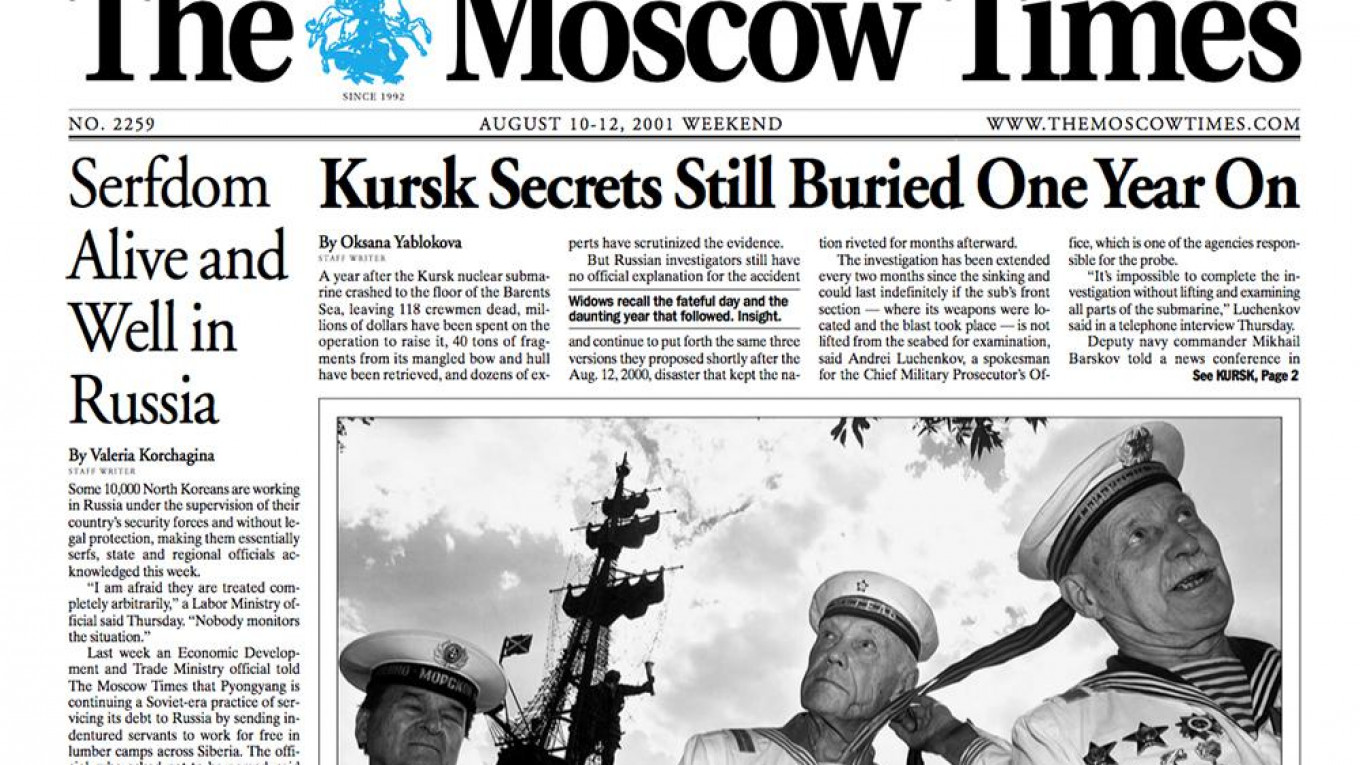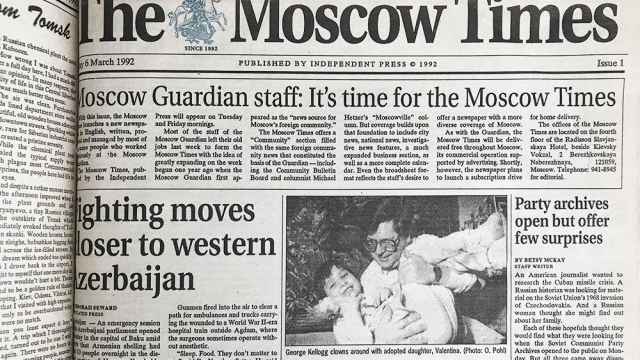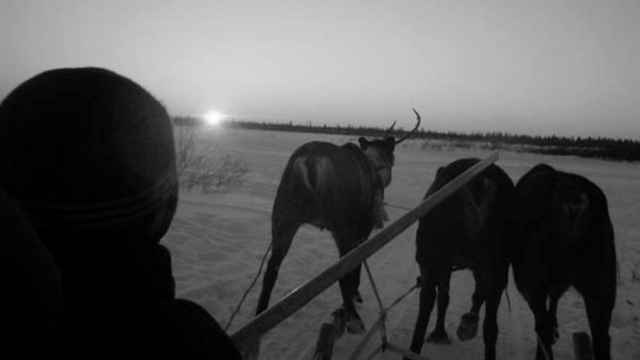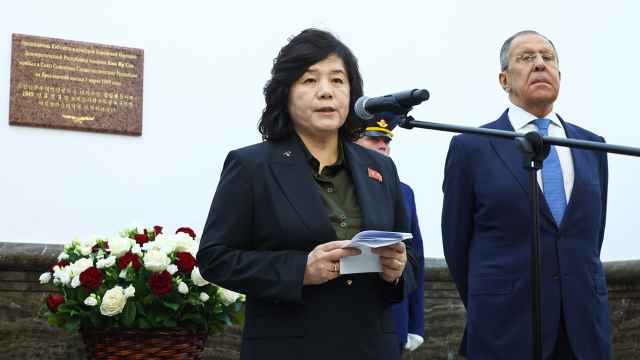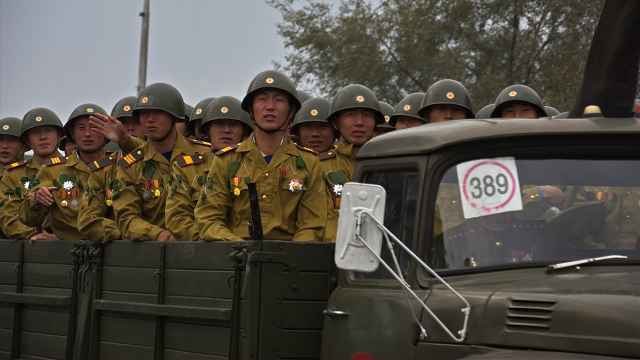In the lead-up to The Moscow Times’ 25th anniversary, we'll be republishing an article from our extensive archive every week, selected by current or former staff.
This article was first published on Aug. 10, 2001, and has not been redacted in any way.
.................................................................................................................................
Some 10,000 North Koreans are working in Russia under the supervision of their country’s security forces and without legal protection, making them essentially serfs, state and regional officials acknowledged this week.
“I am afraid they are treated completely arbitrarily,” a Labor Ministry official said Thursday. “Nobody monitors the situation.”
Last week an Economic Development and Trade Ministry official told The Moscow Times that Pyongyang is continuing a Soviet-era practice of servicing its debt to Russia by sending indentured servants to work for free in lumber camps across Siberia. The official, who asked not to be named, said North Korea serviced some $50 million of its $3.8 billion debt this way last year.
This week, however, the ministry refused to elaborate on the debt-for-labor scheme or how it calculates the value of the workers, who are classified as “goods.”
In fact, none of the 15 or so officials from seven regions and five ministries interviewed by The Moscow Times this week could say how much these laborers earn — if anything — or what kind of labor agreements they have while working in Russia under the supervision of North Korean agents.
Economic and migration officials in the Far East and Siberia said they were powerless to do anything about the conditions under which hundreds if not thousands of North Koreans are working.
“I feel sorry for them. They all look brainwashed,” said Taisia Rozhanskaya, deputy head of the regional migration service in the Primorye region. “They wear pins with the portrait of [Kim Jong-il] and have to attend political gatherings twice a week.”
Rozhanskaya said the 2,000 or so North Koreans currently working in Primorye are involved mainly in construction projects, but she said the working and living conditions are similar to those of the logging compounds.
Construction workers are managed by a state-owned North Korean company, which is tasked by Pyongyang with finding contracts in Russia and supplying the labor force to carry them out. Local authorities have no jurisdiction over the North Koreans, who are housed, fed and supervised by North Korean officials, she said.
Rozhanskaya said these workers are given temporary permits to reside and work only in the immediate area — and if they leave that area they are classified as illegal aliens and are subject to arrest. “But the workers don’t seem to be doing it too often,” she said. “They have to live somehow, and what they get here is probably by far better than what they have in North Korea.”
Those who violate the traveling restrictions or commit other acts illegal under Russian law or considered so by North Korean agents are sent back home.
“I realize that it is a sin to send them back, and most likely the punishment there is very severe,” Rozhanskaya said.
But no matter how they are treated, she said, there is no shortage of demand for cheap labor from Russian companies.
In the Far East region of Amur, OAO Tynda Les, a private Russian joint-stock company, has 1,500 North Koreans working for it in a kind of camp many thought was a thing of the past.
Ivan Gayev, an aide to Tynda Les’s general director, said by telephone that North Koreans had been working the camp for 26 years and that his company inherited it during the course of privatization.
Gayev refused to say whether the workers were paid or treated well, but he did say that his company gets 66 percent of all the trees the North Koreans cut, with the North Korean government getting the rest. He said the North Koreans produced 200,000 cubic meters of timber last year. Assuming the going rate for wood, the North Koreans made Tynda Les about $8 million in 2000.
According to Gayev, the camp still has its own party structure and police force. “The discipline of the workers is also the responsibility of the Koreans,” he said. “And anyone who leaves without a permit is sent back home.”
Company records list at least 240 North Koreans as “missing persons” who are assumed to have run way, he said. “They leave documents behind, and try to make it westward, reaching Irkutsk, Krasnoyarsk and occasionally Moscow.”
At the federal level, the Science and Technology Ministry is technically in charge of supervising the North Korean logging camps, which were established in the Far East more than 30 years ago. By the early 1990s, human rights activists had gathered enough evidence on what actually went on in the camps to paint a convincing portrait of a modern-day gulag system.
Amnesty International, for example, reported in 1996 that the camps were run by North Korea’s notoriously ruthless Public Security Service and were equipped with their own prisons. Amnesty also reported eyewitness accounts of workers being tortured and even executed by the PSS.
A Foreign Ministry spokesman said the lack of protection under the Labor Code is a result of the two countries not having an agreement that outlines working conditions, which relieves both sides of any obligations.
“Such an agreement is currently in the works, and is about two-thirds ready,” the spokesman said. In the meantime, he said, the burden falls on regional authorities to work out the details of any agreement or contract, which are “often based on a very old framework that dates back to Soviet times.”
Yury Zhilkinsky, an official in the Science and Technology Ministry’s forestry department, said North Korean agents still keep a watchful eye over the discipline of the workers, and rule violators are sent home. “But because there are no regular trains, the hooligans are kept in a special intermediary point until a train is available,” he said, declining to elaborate on the nature of the “special intermediary point.”
“Salaries, medical care, and transportation to and from North Korea are the responsibility of the North Korean side, as is maintaining work discipline,” said Zhilkinsky.
“The Russian side only provides equipment [and the trees],” he said, adding, however, that when North Korean state management has difficulties with food supplies, the Russian side sends “the occasional railcar of pollock, and a few bags of rice.”
“The Koreans seem to like pollock a lot,” Zhilkinsky said. Pollock is a variety of codfish.
Officials in Krasnoyarsk said there were at least a thousand North Korean construction workers in the region who are valued because they are cheap.
The North Korean company Renrado, however, claims to pay its workers, who are under strict supervision across Siberia and the Far East, between $500 and $800 a month. The average salary in Russia is about $100, while freelance construction workers in cash-rich Moscow rarely manage to pull in $300.
North Koreans are working with the permission of their government in European Russia as well. There are dozens of small groups of North Korean sharecroppers 170 kilometers south of Moscow, in the Kaluga region, said Nikolai Kamensky, the local administration official responsible for external economic relations.
Local agricultural enterprises assign the groups a plot of land and take a percentage of the harvest — a practice found in many other regions, Kamensky said.
A Message from The Moscow Times:
Dear readers,
We are facing unprecedented challenges. Russia's Prosecutor General's Office has designated The Moscow Times as an "undesirable" organization, criminalizing our work and putting our staff at risk of prosecution. This follows our earlier unjust labeling as a "foreign agent."
These actions are direct attempts to silence independent journalism in Russia. The authorities claim our work "discredits the decisions of the Russian leadership." We see things differently: we strive to provide accurate, unbiased reporting on Russia.
We, the journalists of The Moscow Times, refuse to be silenced. But to continue our work, we need your help.
Your support, no matter how small, makes a world of difference. If you can, please support us monthly starting from just $2. It's quick to set up, and every contribution makes a significant impact.
By supporting The Moscow Times, you're defending open, independent journalism in the face of repression. Thank you for standing with us.
Remind me later.


